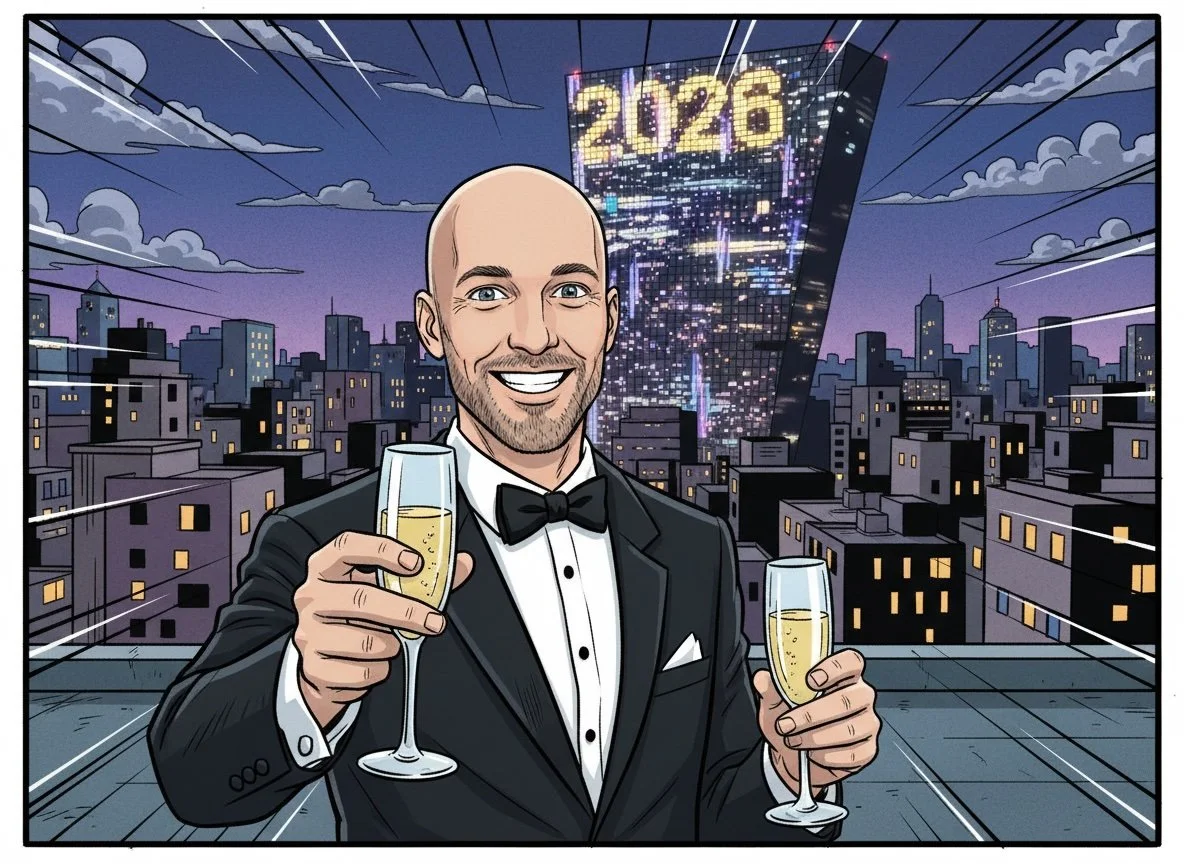
Inspiration and news
Happy New Year and all the best for 2026!
Whether you were celebrating at home, quietly on a mountain top or like me somewhere on the move, the beginning of a new year motivates us to think about what is really important to us and what we wish to achieve. The fact that the number of resignations rises in January is an indication of big decisions being made during the festive season. However, in most cases smaller projects emerge as surveys confirm that around 60% of Swiss people make New Year's resolutions. However, sticking to them and putting them into practice is often difficult once one is back in everyday routine.
The success rate of New Year's resolutions is less than 20%, and more than half of the people give up on their plans as early as January.
To achieve a personal goal – whether at the start of the year or as part of a coaching – it takes several steps to reach success. In short: It starts with an appealing and motivating goal, continues with clarity about the first concrete steps that can be easily integrated into everyday life, and ends with a reward-oriented monitoring system to maintain the perseverance needed to build a new habit. In detail, the steps to implement your New Year’s resolution are as follows.
In eight steps to more success in reaching your goals
1) Be clear about your goal
To know what one wishes to avoid does not create the desired reorientation, but rather a gap that is usually filled with the behaviour one wishes to avoid. That is why it is so important to formulate one’s goal in a positive and smart way with the individual letters standing for specific, measurable, attractive, realistic and time-phased. One should be able to visualise, feel and touch the target state. What are you doing specifically? How and when? Who and what do you need to do this? How does it feel? Such a concretisation does not only happen with one’s head, but also with one’s heart and gut, as feelings guide us more than our minds in everyday life.
2) Weigh up the pros and cons
A formulated a goal needs to be checked for its effects: What are the advantages of achieving the goal? What are the possible disadvantages? How can such disadvantages be reduced or avoided? Is the overall balance right and, if not, what could be an alternative goal? Only if achieving the goal creates something positive and of sufficient importance will there be motivation to implement it.
3) Develop an implementation plan
Achieving great things or forming a new habit takes time and many small steps. It is therefore important to consider what is specifically needed to achieve the goal and whether there is an easier way towards it. As an inner film you experience the new future, observe yourself during the implementation, examine alternatives, feel the success of implementation and thereby gain clarity about the next steps.
4) Check the impact of implementation on the environment
Even if a goal is beneficial to oneself and its implementation seems feasible, there is another step to consider: we are part of a system and our actions have an impact on the environment. If a goal has a negative impact on the people around us, they will discourage us from implementing it, or we ourselves will stop implementing it as soon as negative side effects become apparent. How would my best friends react? What do my colleagues think about my goal? What is the opinion of my family, my parents? If my dog or cat could talk, what would they say? Questions like these help us to anticipate the reaction of those around us and adjust our goal if necessary.
5) Identify potential implementation difficulties
Even if the implementation is well planned, there will be surprises and obstacles. Identifying such difficulties in advance and developing countermeasures prepares for everyday life. What would have to happen for you to give up on your goal? Who or what could challenge your implementation plan? What could be the most unpleasant difficulty? Analysing these situations in advance gives you even more confidence that you will achieve your goal.
6) Keep the goal in mind
Implementation happens when one aligns ones behaviour with ones goals. How do you remember your goal? How do you keep it visible? When and how do you need a reminder? Possible strategies include visible trainers when you come home or a Post-it note with a smiley face insde the fridge. Whatever helps to keep the goal and, above all, the associated added value in mind creates energy for implementation.
7) Persevere and celebrate your first successes
The more often you do something, the more it becomes a habit and thus an automatic action that no longer requires focus. Depending on the study, 21 to 66 days are cited as the required time frame. Since initial successes can be subtle and almost invisible, it helps to install a careful monitoring system. What has already changed? What has worked? What effects are becoming apparent? Celebrating milestones and being forgiving of setbacks helps to fuel motivation and stay on track.
8) Celebrate achieving your goal and reflect on how you got there
Reaching the goal often feels less spectacular than one expects. Nevertheless, it is important to acknowledge this moment and reflect on what was helpful and what was not when working towards one’s goal. Furthermore, it is recommended to feel the sense of achievement as it creates motivation to define a new goal and get going again. Successful people report that the feeling of happiness they experience when they achieve a goal gives them the perseverance to stick with it when they encounter difficult situations.
Find goals worth the effort
The eight steps show that achieving a goal takes effort, which is why a hastily formulated New Year's resolution that is only half-heartedly desired rarely comes to fruition. This makes it even more important to choose a goal with care. The following ideas can help you formulate exactly such goals for yourself.
Let's dream a dream
Based on the first two steps of Appreciative Inquiry, we first note down our personal strengths and then dream about what could be achieved with them. A moment of lying on the sofa, a walk on your own or dreaming with someone else can help to ensure that dreams are genuine life aspirations and visions that can then be reformulated into concrete intermediate steps and goals.
Looking back on the new year
Alone or as a group, think about what you want to toast at the end of the new year and work out what needs to happen to get there. This allows you to formulate both big and small goals and then make them concrete.
Bucket list for your life
To think big right away: Write a wish list of all the things you want to happen in your professional and private life before the end of your life, so that you can derive annual goals from it.
Ask others to formulate your goals
Instead of formulating goals yourself, ask your friends to write down goals and give them to you as gifts. In the next step, you can select the goals that appeal to you most and then refine them further to make them your own.
Grazie – Tak – Merci – Dank je – Spasibo – Danke – Gracias – Thank you
Moments of gratitude – throughout the year or especially at Thanksgiving in the USA or at the end of the year in Switzerland – are doing good things for us. What self-help books call “practising gratitude” is described as “counting your blessings” by the English. It refers to the attitude of focusing on what is there, on what is going well. This does not mean denying or ignoring the difficulties. But gratitude for the good things creates the energy and confidence to deal with life’s challenges, too. Research about resilience and happiness has investigated the effect of gratitude, with some exciting insights.
"I'm glad when things remain objective at work. When things get emotional, I always feel a little overwhelmed."
While enthusiasm for the job, commitment to the team and the company as well as contentment about success are desired or even demanded, anger, rage, sadness or helplessness remain unwelcome guests in a professional context. However, as Laloux describes in his book Reinventing Organisations, if you want employees who invest themselves in the company with their minds and hearts, the darker side of emotions cannot be cut away or suppressed. Everything is needed, and studies show that companies with a healthy conflict culture are more innovative and therefore more profitable.
"We want to build a feedback culture in our team!"
Teams and managers come to me with such requests and ask for feedback training: “We want to give each other regular feedback, learn from each other and evolve.” There is often a difference in understanding what feedback is, and when clarifying the request for support, I ask whether feedback is understood as an information on something that I may not yet be aware of (blind spot), or whether it is more about offering criticism with an included desire for behavioural change. Once the understanding of the term has been clarified, the focus of the ‘training’ quickly becomes clearer, and it is usually less about how to give feedback but about building motivation to do so.
"When do you need team development as a team?"
If one has never experienced team development and the associated added value of it, it can remain unclear when a team needs such a team-out. However, the experiences associated with team development are not always positive, as my own first experience many years ago shows: the external facilitator had not been informed about the team-internal conflicts, the day’s agenda was as a consequence chosen inappropriately, the tensions exploded an hour before the end of the day, and on the same evening the team leader resigned.
Maybe that is why it is important to me to repeatedly explain what good team development can be, as I hear too often from teams that a day ended in tears, that individuals felt exposed, or that team dynamics were even worse afterwards. Yet, with the right set-up and the appropriate methods, great things can be achieved.
"Whenever an ambulance drives past me, I know I have to be careful today!"
I remember this statement and the exercise that went as if it was yesterday. 2016 in Berlin on a gloomy Friday afternoon during my training as a change process facilitator. We were given the task of choosing a question that was currently on our minds. To then go outside. To completely clear our minds and connect with the world. “Flirt with the world, and the world will flirt with you!” was the invitation. I do not remember the question I chose, nor do I remember my attempts to flirt with the world. But the subsequent debriefing and the comment made by a fellow participant “When an ambulance passes me on the way to a workshop, I know that today I have to be careful” is still with me today.
"It should be possible to use a few questions to find out where a team's strengths lie and where the areas for development are!"
"It should be possible to use a few questions to find out where a team's strengths lie and where the areas for development are!" A participant in the ETH leadership seminar asked me this in a slightly demanding tone. I thought for a moment and replied: "There are various questionnaires and models for teams and team dynamics, but they each focus on one aspect of a team. As far as I know, there is no collection of questions that looks at a team as a whole. But something like that can be developed.".
Feeling a bit like Heidi Klum!
A little Heidi Klum feeling: an impressive CV and the skills required for the next step in your career. An assessment center as a stopover to achieve this goal. Me as a coach at my side, helping with the preparation and suddenly feeling a little bit like Heidi Klum sending her models onto the catwalk.
Can you kiss the frog prince?
Can you kiss the frog prince? This question stuck with me and I still differentiate between HR and organizational development based on this logic today. While HR development is about helping employees realize their potential and turning them into princesses, organizational development is about a system that cannot be kissed.
"Since I turned my vocation into my profession, working feels like leisure time!"
This feedback pleased me particularly, as I feel the same way since the change into my current role but also because the starting point for the coaching regarding a professional reorientation had not been the easiest: a position that had been achieved through a lot of effort and personal investment, with the prospect of a next career step. Further education in a field that did not immediately promise career change opportunities combined with the desire for more meaning and fulfilment at work.










